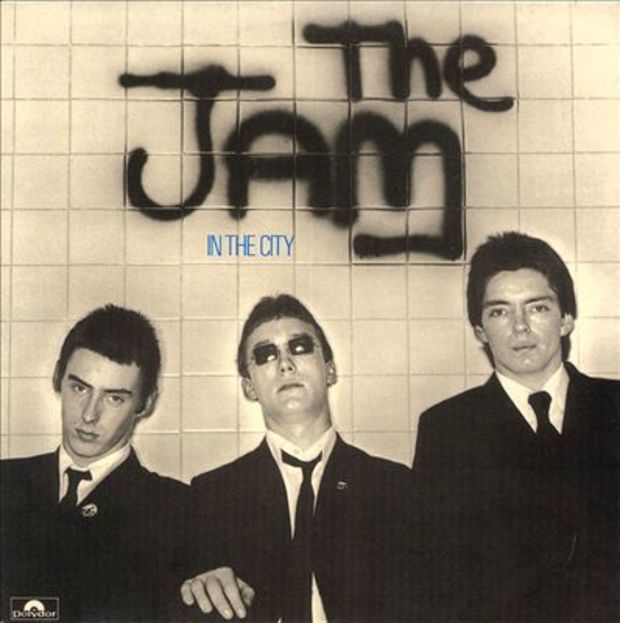The Jam: About The Young Idea is on at Somerset House now.
When I was sprinting home at lunchtime on Tuesday 18th March 1980 to listen to the new Top 40 run down, I couldn’t have known it was the start of a journey that would eventually allow me to befriend the man whose record I was desperate to hear about. And that I’d get the one job I wanted which allowed me to meet all my other musical heroes, get to travel round the world watching gigs and talking to the people performing them, and then go away and have people actually listen to my opinion on them in the NME.
Back then, all I knew was I had a mile to sprint between the time I’d nicked out of class early and the final run down of the new record releases on Radio 1. When you’re 14 in the pre-internet pre-digital music days you could do that, run a mile to hear a record.
I can still feel the burn as I pelted the full distance, the same journey the great Alan Bennet took back to his father’s butchers which sat opposite the ginnel that lead to my mum's flat. The memory is vivid but all these facts – the date, the exact distance, the literary neighbour – these I’ve gleaned from Wikipedia.
Back then there was no internet to instantly find out anything about the bands I loved or hear and see them play their music. It was dead simple. You bought a record or had to have a portable radio on constantly in the hope of hearing the random broadcasting of the songs you loved. Three times a week you had an appointment with its broadcast – Tuesday lunchtime New Chart announcement, Thursday early evening for Top of The Pops and Sunday night for the retrospective chart run down of that previous week’s sales, if it was a hit. Music media was pretty much as it had been when our parents had been buying singles. Probably worse.
Beyond that if you wanted to know about the bands you were into you sat around for ages staring at the record sleeves whilst listening to them, reading every single word on them from the producer to the Pressing Plant, including the scratched message in the run off groove of the vinyl itself. Then once a week the music press would appear, the New Musical Express, Sounds, Melody Maker (and then the fledgling Smash Hits). Big format, print heavy, newspapers full of interviews, reviews, record release and tour news and adverts for venues you could actually go to full of the opinions of what appeared to be over-confident, angry, self obsessed music fans with strange names. It seemed like the perfect place for me to work. Given that my lack of vegetable intake had prevented me growing enough to play for Leeds United and my mates who owned instruments would go on to produce dirge like anarcho-punk in bands called Toxic Waste and Scum Dribblerzzz, it seemed unlikely I was going to be troubling any of my other dream jobs. Professional football and music were probably out.
Like many others this hunger for music news pretty much was my life. I didn’t go to University to learn about journalism, I went to the newsagent on a Wednesday and found these papers, each week I would select one depending on who was mentioned on the cover. And the band I primarily wanted to know about was The Jam. Paul Weller, Bruce Foxton and Rick Buckler made songs I loved. Their loud crashing roars of socio-political fury rang an alarm bell with me that didn’t stop ringing until I’d got somewhere I told myself I needed to be. And that wasn’t doing Double Physics in an ancient science lab.
Piling into my mum’s flat I heard the Radio One DJ doing the new top 30 run down that came after he’d played the top 4 and before he played the new number one. Breathless, exhilarated. I kept waiting for ‘Going Underground’ to be mentioned and it didn’t come which could only mean one thing. An absolute rarity, straight in at number 1.
They were the first band to do that since Slade half a decade before. ‘Going Underground’, with its catchier singalong chorus had been chosen as the A side but the AA side ‘Dreams of Children’ was the better song. The backward tracked intro made it harder for the dork DJ’s on Radio One to talk over so ‘Going Underground’ got the most attention.
Looking back 1980 was a good year for number ones, and the new generation of bands that had emerged over the previous three years were finally big enough to have become the best selling artists in the land. As you’ll see from the other occupants of the number one spot, it’s rare the best music is also the best selling. The year started well with The Pretenders with Brass In Pocket at number one, fronted by former NME reviewer Chrissie Hynde but ended with the St Winifred’s School Choir, a group of primary school children bleating out a smaltzy little number called ‘There’s No-One Quite Like Grandma.’
If you ever wanted proof that the charts are primarily the supermarket of music, the high street pick, light entertainment not soul wracked passion, a fruit fancy, a sentimental splodge, then it was these kids and their cheesy ditty that kept John Lennon from the top of the end of year chart (when you were number 1 for two weeks and got TWO Top of The Pops performances) a fortnight after he’d been murdered. Sure he’d topped the charts the week he’d died and again for the first six weeks of the new years when all his old singles were re-issued, but Christmas was blighted by the squeaking of unlovable little cuties. It wouldn’t surprise me if the BBC rigged this to stop the festive season being blighted by the site of a man who’d been gunned down.
Throughout the year the band heavily inspired by Lennon, The Jam, had topped the chart twice, their first number one was a double AA side of 'Going Underground'/'Dreams of Children', their second was ‘Start’. At other times across the year Dexy’s debuted with ‘Geno’, The Specials had 'Too Much Too Young', Blondie went ‘Atomic’ and suggested you ‘Call Me’ before declaring ‘the Tide Is High’. David Bowie brought Major Tom back with ‘Ashes To Ashes’ and its utterly spookie video.
It was a great year for number ones but it was a terrible year too. Or maybe it was better that these bands I loved were battling for sales supremacy with the other occupants of the coveted spot Kenny Rogers, Johnny Logan and Kelly Marie. A stark outline of the good and the terrible.
The Jam meant everything to me, for a start they didn’t look much older than my schoolmates and I - Weller was 22 that summer. Their clothes were affordable. It wasn’t some sort of distant unachievable pop start dream, there were guys I knew who were as cool as The Jam.
And if their songs weren’t articulating the anger, the fear of having American Nuclear Weapons on our soil, rising unemployment and a future with little opportunity, they were getting down those David and Goliath feelings young guys had, wanting to get out there against the odds and do something.
‘Strange Town’, ‘Boy About Town’ ‘In the City’, ‘When You’re Young’, ‘Thick As Thieves’, ‘Eton Rifles’, I knew the opening verses of them all, in many cases all the lyrics. In the idealistic outlook of the young music fan The Jam had it all, right and wrong, good and bad, great anthems you could jump up and down with your mates and feel the lyrics and know they were about your life. I didn’t quite get the same buzz from Elton John’s Rocket Man which Radio One were so keen on playing.
The Jam were documenting something that was becoming pretty apparent to my generation. You’re on your own, it’s a big wide world and you’re only one person, but you don’t be afraid to go out there and get a bit of it.
And I guess that’s what The Jam, and The Clash, Dexys, The Specials, The Beat, the Undertones and Buzzcocks were to me. Someone dangling a ladder, a Billy Liar-esque way out of where I was, I wasn’t sure where I was going but in classic teen angst way I definitely wanted to go somewhere. Unlike Billy I was getting away and I guess the music papers became my train.
I discovered if you wrote letters to them, capturing the frustration you felt at not knowing half of the bands in the publication, claiming you could do better, making the writers feel old and past it, they would actually print them.
They were my first steps into music journalism, having letters cheeking off the writers of the NME for always banging on about Iggy Pop and Television, bands I had no way of hearing. Most of my mates at school were listening to Hawkwind and Rush and the older guys in the street I knew who had first played me ‘Slider’ and ‘Diamond Dogs’ had all gone off to the pub, they weren’t playing football with little kids any more.
If you liked this, have a look at these...
‘The Distance’: The Review That Inspired Me To Become A Music Writer
‘Brown Sugar’: The Song That Inspired Me To Become A Music Writer
‘Seven Nation Army’: The Song That Inspired Me To Become A Music Writer


